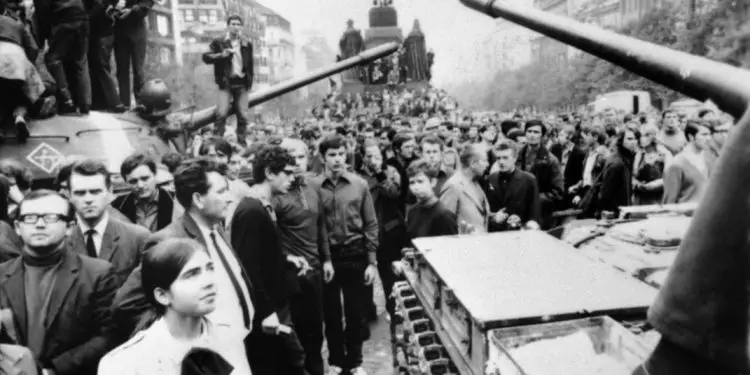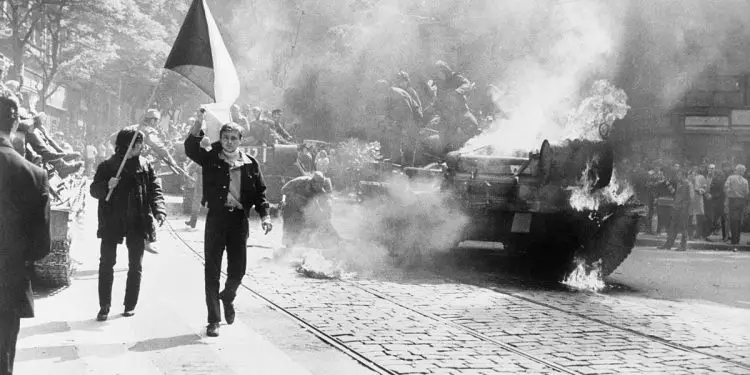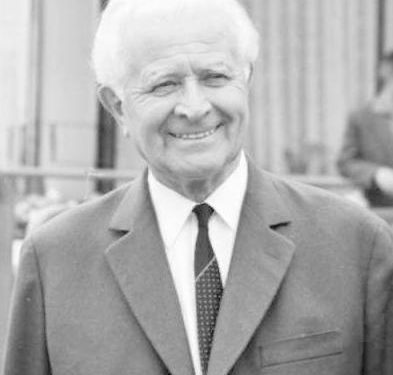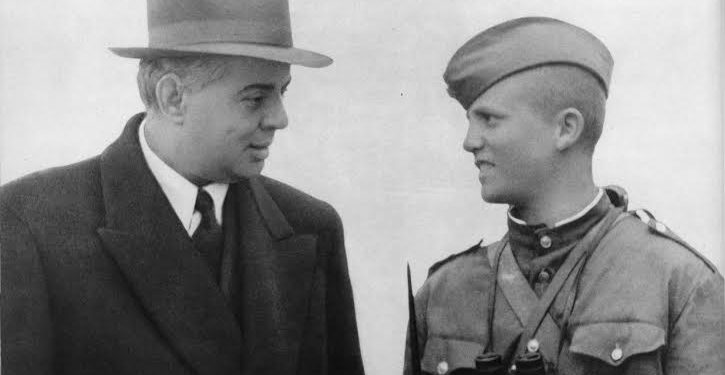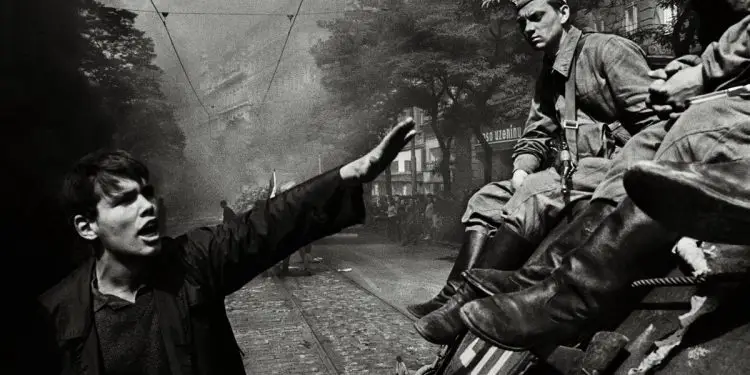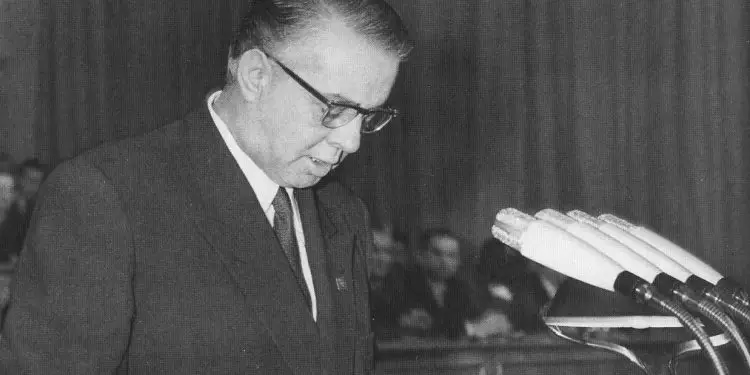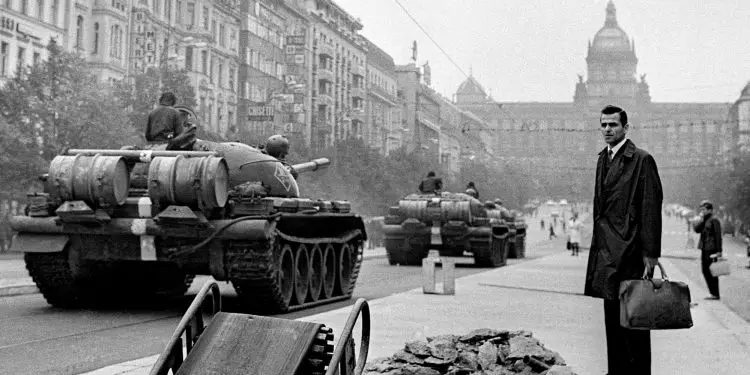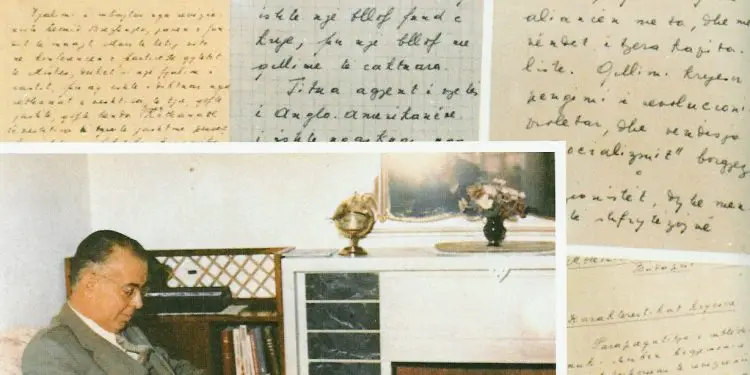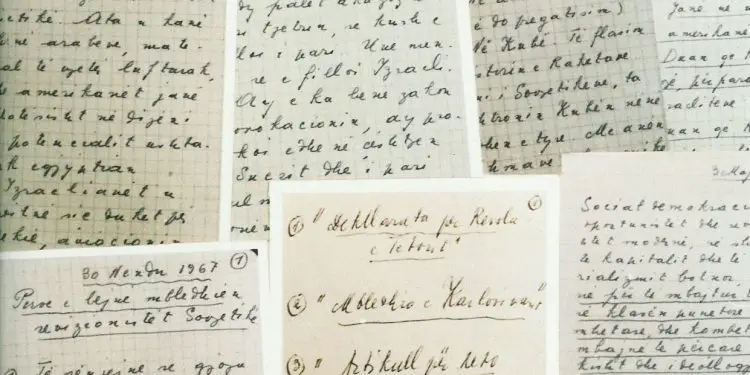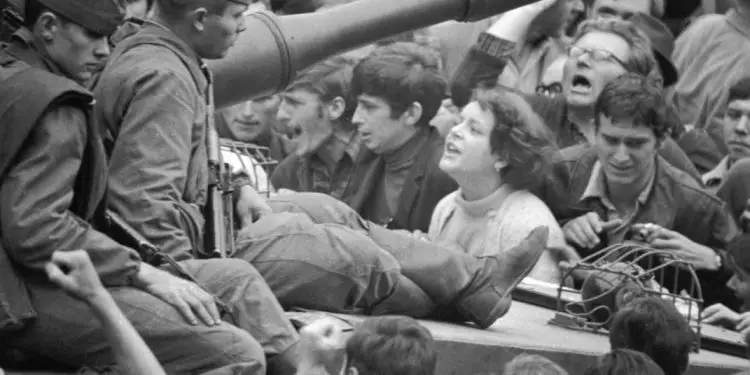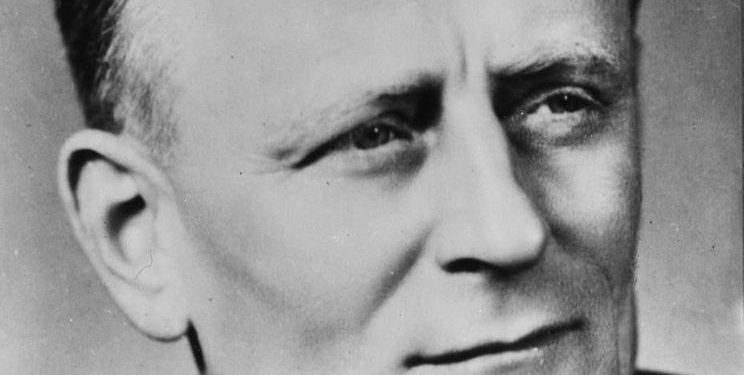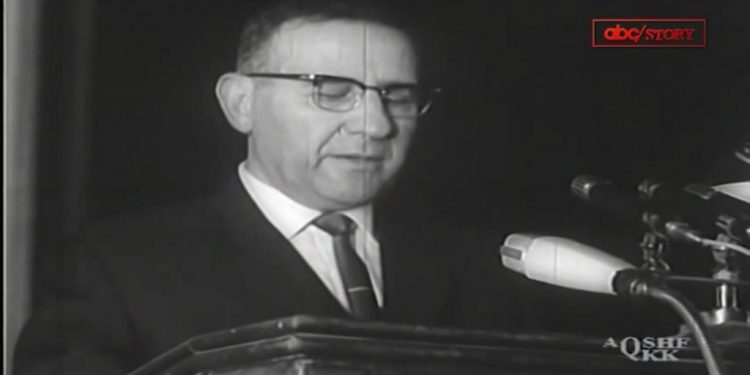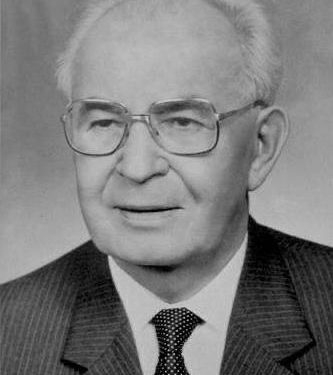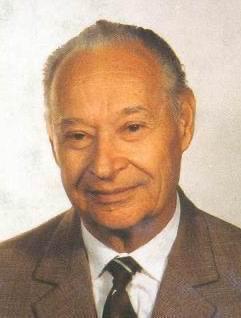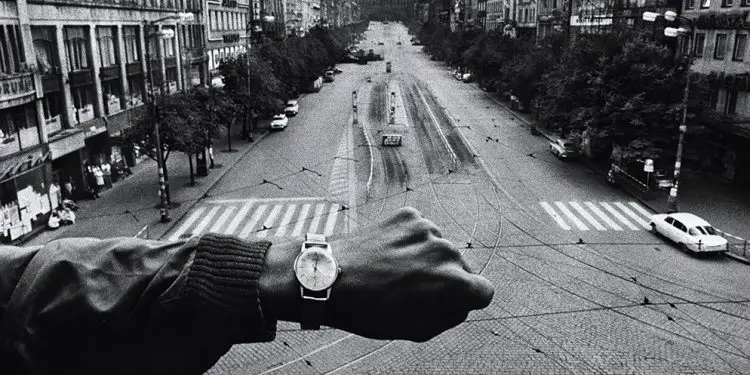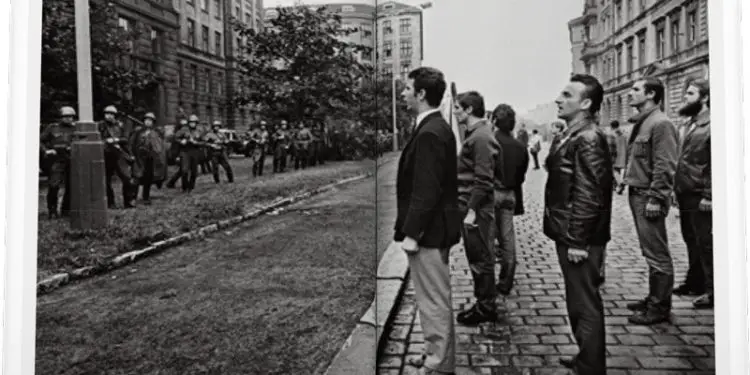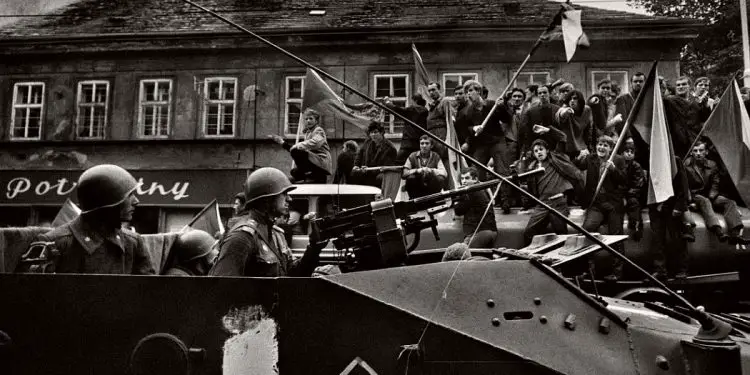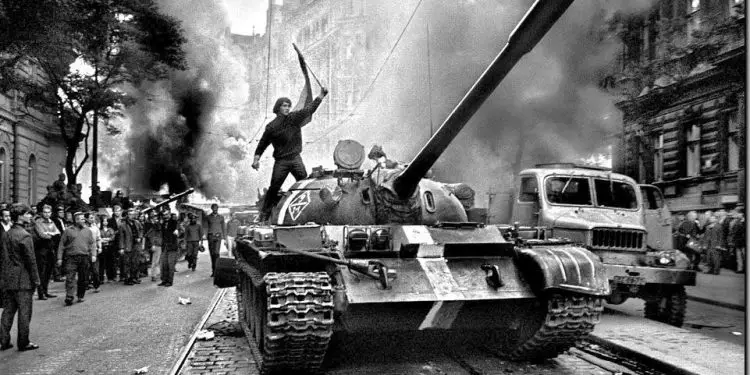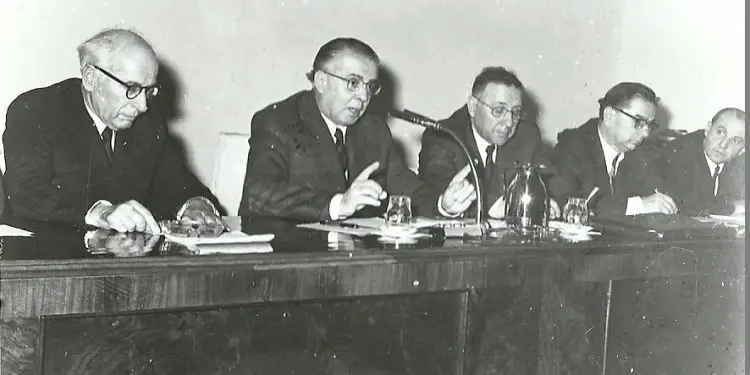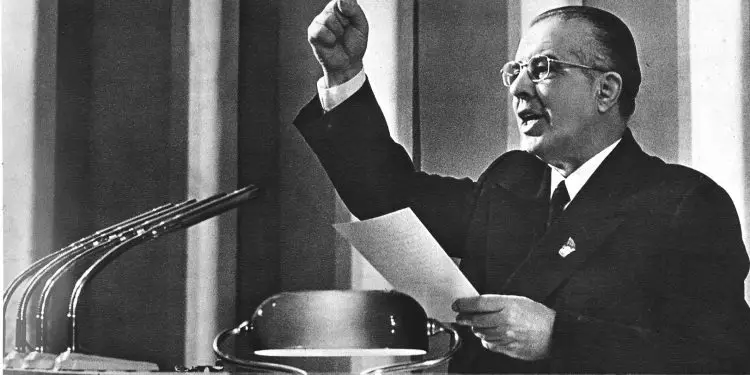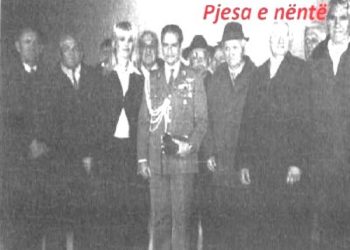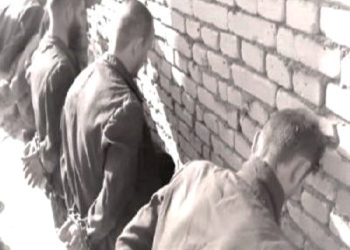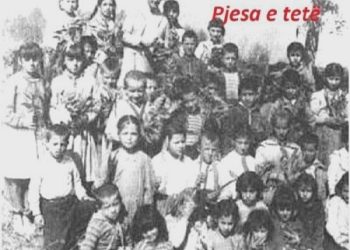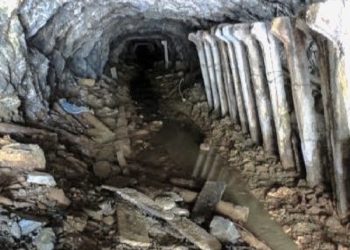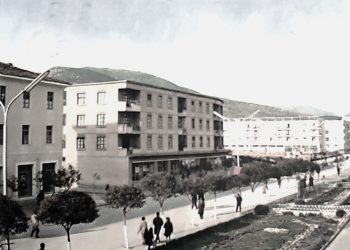Dashnor Kaloçi
Memorie.al publishes some archival documents extracted from the Central State Archive in Tirana (fund of the former Central Committee of the ALP), which also contains the diary of Enver Hoxha, who has kept notes and made analysis of the events in Czechoslovakia from January 1968 until August 21 of that year, when Soviet troops, along with those of the other four Warsaw Pact countries (East Germany, Poland, Hungary and Bulgaria), carried out military aggression, invaded Czechoslovakia. All the unknown notes of the leader of communist Albania regarding the events in Czechoslovakia, from the position of other Eastern European countries, part of the “Warsaw Pact”, to that aggression, the accusations against Ceausescu, Josif Broz Tito, etc., comments and the accusations against the USA, Enver’s writings in the newspaper “Zeri i Popullit” about all those events, up to the messages he gave to Haxhi Lleshi for his Bulgarian counterpart!
“Soviet, Polish, German, Hungarian and Bulgarian revisionists entered from all four sides of the Czechoslovak border and, overnight, until the morning, occupied Prague, seized the radio, surrounded the government building, the Central Committee, the Parliament, the the president and no rifles were heard. Not only that, but the Czechoslovak revisionist leaders ordered the army and the people to “remain calm and calm”, according to the “tradition of their character”. As for Romania’s aid, according to the treaty, there is no need to go too far: Romanian revisionists have done it in their panties and the world will soon stink. Of course we are still in the first moments and events will definitely take place. Soviet revisionists did a desperate, deadly act for them. They were discredited from all sides, even to their revisionist friends, because most of them do not agree with this brutal act with serious consequences for them. But the Soviet revisionists did not do this desperate action out of longing, but out of grief, knives came to their throats. Certainly in the midst of the Soviet revisionist leadership, there will be changes, there will be sacrifices. Who are they? Will see. Who will remain? The military must have a hand in these events and their point of view has prevailed. All this development will aggravate the international situation and there is a possibility that the revisionist-capitalist opinion will be alarmed. Contradictions will deepen, the waters in the stinking swamp of peaceful coexistence will be disturbed, and the Russian-American alliance, if not cracked, will suffer serious scratches. World opinion, fears, doubts will play their part. “Revisionists, whether they are from or not, will become quarrelsome with each other, wool and linen, worse than what they have done.” This is what the Albanian communist leader Enver Hoxha wrote in his diary on August 21, 1968, about the event that took place in the morning of that day, when the Soviet Union under the leadership of Leonid Brezhnev, together with the military forces of the four countries other “Warsaw Pact” (East Germany, Poland, Bulgaria and Hungary), carried out military aggression against Czechoslovakia, moving tanks as far as the center of Prague. This event was considered and was the most serious in all of Eastern Europe, after what happened in Hungary in 1956, where Soviet troops intervened to extinguish what they labeled the “Hungarian Counter-Revolution”. As we will see from Enver Hoxha’s diary, the occupation of Czechoslovakia by Russian troops and its allies in the “Warsaw Pact” could not but alarm the communist regime in Albania, as official Tirana feared a “domino effect”. as had happened not infrequently in history with such events. But the fear and panic that gripped Enver Hoxha and all the top communist leadership in Tirana at the time, from a possible invasion of Albania by the Soviet Union and other Warsaw Pact countries, seems little or not at all. has taken place in Enver’s diary ?! After that, the communist regime was put on a great alarm, starting from the Army that passed to “readiness no. 1” (as in a state of war), but also the volunteer and reserve forces were mobilized, which took part in major exercises that began at that time by the largest units of the Albanian army, such as the Corps. Likewise, the civilian population of villages and towns responded to air or ground alarms (signaling sirens or bells), placing them in underground shelters (tunnels) located inside or on the outskirts of cities. But all this was only the obvious and completely normal side for a country like communist Albania of that time, because in the same situation were and acted more or less the neighboring countries, such as Yugoslavia, etc. While what is little known is the fear that invaded Enver Hoxha and the communist regime, from a movement that could happen from within the country. This is noticed and confirmed, among other things, by a number large archival documents (fund of the former Central Committee of the ALP), where the Ministry of Internal Affairs and State Security, inform the Central Committee of the ALP and its main leader, Enver Hoxha, Hysni Kapon, Ramiz Alina , Mehmet Shehu, etc., with reports, reports, information, etc., where the main topic is: “On the situation and the situation in the country after the events in Czechoslovakia”. In all those documents that bore the logo “Top Secret”, it is made known to the top leadership that: “the people and mainly the reactionary element, has been revived after the events of Czechoslovakia and”. “. This caused Enver Hoxha and the communist regime on the one hand to “tighten the ranks” and “increase vigilance”, which consisted of arrests, imprisonment and mass internment in all districts of the country, and also on the other hand, “Let go of a few threads”, in what is now known as the “period of liberalism”, which was not long-lived and would “flourish” until the beginning of 1973, when Enver Hoxha began the crackdown on the 11th Song Festival in Radio-Television and the “Liberal Group in Art and Culture”, headed by Fadil Paçrami and Todi Lubonja.
How did the events from January 1968 to August 21, when the invasion of Czechoslovakia took place, precipitate?
But before we publish what the communist leader of Albania wrote in his diary about the events in Czechoslovakia, which was the first news of all the world press agencies, it is worth taking a retrospective to see how the events unfolded and perceived from January 1968 until August 21, when Soviet tanks occupied Prague.
On January 5, 1968, Alexander Dubcek, the number two Communist Party of Czechoslovakia, considered a liberal communist, replaced Antonin Novotny, who had been at the helm of the party until then, and announced his intention to move forward with reforms. extensive. Novotny, meanwhile, was criticized by party liberals and prominent Czechoslovak intellectuals for his government’s poor economic performance and anti-Slovak prejudices. Unlike him, Dubcek was seen as the “perfect compromise candidate”, acceptable to both members of the Conservative Party and the reformist wing. After this “rocket”, the leadership of the Communist Party of Czechoslovakia, led by Dubcek, approved the enlargement. of the economic reform program started in 1967. Meanwhile, journalists, students and writers called for the repeal of the 1966 press censorship law.
Meanwhile, since the beginning of March, public rallies held in Prague and other cities and towns in support of liberal reform policies have been increasingly critical of Novotny’s presidency, and given the situation, on March 22, Novotny was forced to resign. by even the president of the Czechoslovak federation, after facing pressure from party liberals.
One week later, on March 30, General Ludvik Svoboda was elected President of Czechoslovakia. Svoboda was considered a “War Hero” and had served in the Czechoslovak Legion at the start of the Russian Civil War in 1918.
On April 5, the “Communist Party Action Plan” was published, part of the effort to secure “socialism with a human face”, which had long been preached by Dubcek, who at the core of that program had the “democratization” of the system. political and economic.
The document refers to a “unique experiment in democratic communism.” But in the meantime, this meant that the Communist Party would henceforth have to compete with other parties in the elections. The document envisioned a gradual reform of the political system over a 10-year period.
On April 18, a new government was formed under Dubcek ally and reformer Oldrich Chernik. All these changes made the liberalization process move more and more, which was also evident from the freedom of the press that was becoming more open in support of human freedoms.
On May 1, Labor Day celebrations showed strong support for the “new cause,” and a few days later, Czechoslovak leaders visited Moscow, where the Soviet leadership expressed dissatisfaction with developments in Czechoslovakia.
On May 29, a number of senior Soviet military officials visit Czechoslovakia to begin some major Soviet military exercises there. On June 26, it was officially announced that censorship had already been lifted.
On June 27, the “Two Thousand Words” manifesto was signed by the reformers, including some members of the Central Committee of the Communist Party of Czechoslovakia, which was published in the “Literarny Listy” and other publications. That manifesto called for “democratization”, the re-establishment of the Social Democratic Party and the creation of “Citizens’ Committees”. The manifesto was a more radical alternative to the “Program of Action” held in April by the Communist Party.
On July 4, Soviet military exercises began in Sumava, aimed at strengthening anti-conformist forces in Czechoslovakia. On July 15, representatives of the communist parties of the Soviet Union, Hungary, Poland, East Germany, Romania and Bulgaria met in Warsaw and, after a quiet round of talks, decided to send a diplomatic note, strongly expressed and warning. the new Czechoslovak leaders, that: “the situation in Czechoslovakia endangered the common vital interests of other socialist countries.”
From July 29 to August 1, talks take place only between the presidencies of the Czechoslovak and Soviet communist parties in Cierna-nad-Tisou. There Dubcek argues that “reforms do not jeopardize the role of the party, but build public support.” The Soviets did not accept these arguments and harshly criticized the Czechoslovak movements, which was a kind of open pressure where the threats of invasion were clearly felt.
Meanwhile, on July 31, East Germany, Poland, Hungary, Bulgaria, and the Soviet Union announce that they will hold military exercises near the Czechoslovak border. On August 3, a meeting of the “Warsaw Pact” (excluding Romania) was held in Bratislava. The meeting brings a seeming reconciliation between the leaders of the “Warsaw Pact” and the Czechoslovak leadership. Here, for the first time, the so-called “Brezhnev doctrine” of “limited sovereignty” is announced. The Soviet leader of the Kremlin, Leonid Brezhnev, receives a handwritten letter from five members of the Czechoslovak Presidium warning that “the socialist order is under threat” and asking for military intervention.
Thus things were getting worse and on August 18, the Kremlin decided to invade Czechoslovakia. The commander of the Central Soviet Forces, General Alexander Chitizov, recounted how Soviet Defense Minister Andrei Grechko told bureaucrats and military leaders: “The invasion will take place even if it leads to a third world war.”
And so it happened, on August 20, 1968, Czechoslovakia was occupied by about 500,000 troops from the armies of the five Warsaw Pact countries (Soviet Union, Poland, Hungary, Bulgaria and East Germany), which overnight on August 21, all entered in the territory of Czechoslovakia. Meanwhile, only Romania and Albania publicly denounce the invasion of Czechoslovakia.
On August 21, shortly after 1 a.m., Czechoslovak state radio announced the invasion by troops of the five Warsaw Pact countries. The speaker announced that: “The invasion took place without the knowledge of the Czechoslovak authorities and the Presidium calls on all citizens of the Republic to maintain peace and not to resist the progressive armies”, emphasizing that “the protection of our borders is now impossible and the army she has been ordered to stay in her barracks and not to resist. ”
Also on August 21, at 3:00 am, the Czechoslovak Prime Minister Oldrich Chernik, Dubcek, Jozef Smrkovsky and Frantisek Kriegel, the four leading reformers in the Czechoslovak leadership, were arrested in the building of the Presidium of the Communist Party by Soviet airborne troops.
Following this, leaflets were distributed by the government, which was already under occupation, stating, among other things: “Military troops were sent to come to the aid of the working class and all the people of Czechoslovakia to protect the socialist benefits.”
At 05.30 on 21 August, the Itar-Tass Telegraph Agency reported that the Communist Party of Czechoslovakia and government officials had requested urgent assistance from the Soviet Union and other fraternal countries. 30 minutes later, at 06.00, Svoboda, on the radio, calls for calm, saying “people should go to work normally”.
At 08.00, crowds of Czech citizens and Soviet troops confront each other in “Old Town Square” and “Wenceslas Square”. Tanks of the invading armies appear in the Museum and begin to open fire on nearby buildings and in the direction of the National Museum.
Dubcek and other party leaders, meanwhile, have “flown” to Moscow and are forced to take part in talks with the Kremlin leadership. They sign a document, in which they give up part of the reform program and agree on the presence of Soviet troops in Czechoslovakia.
The invasion of Czechoslovakia attracted the attention of Western powers, as well as communist and socialist parties in the West. US President Lyndon B. Johnson calls on the Soviets to withdraw from Czechoslovakia. On August 23, Svoboda “flies” to Moscow with a large delegation of Czechoslovak communist leaders to negotiate a solution.
On August 25, Czechoslovak leaders sign the so-called “Moscow Protocol”, which relinquishes part of the reform program and agrees to the presence of Soviet troops in Czechoslovakia. On August 27, Svoboda returns to Prague with Dubcek, and Chernik.
On August 31, the 14th Congress of the Communist Party of Czechoslovakia was declared invalid, as required by the Moscow Protocol. Censorship has been restored in place.
On September 13, Albania formally withdraws from the “Warsaw Pact”, while Romania begins its autonomous political line from the Eastern Bloc, to establish closer ties with the West.
On October 28, Czechoslovakia becomes a Federal Republic, thus being the sole primary objective of the reform process that was implemented.
On January 16, 1969, the Czechoslovak student Jan Palach, wakes up in one of the demonstrations held in the middle of Prague, in protest of the Soviet occupation of the country.
On April 17, 1969, Dubcek resigned as the first secretary of the Communist Party of Czechoslovakia, following the riots that followed the victory of the Czechoslovak hockey team over a Soviet team in Stockholm. Dubcek was replaced by Gustav Husak, who had the full support of the Soviet Union.
Enver Hoxha’s diary with notes on the events of the occupation of Czechoslovakia by the Soviet Union
WEDNESDAY
AUGUST 21, 1968
SOVIET REVISIONISTS MILITARY INVADE CZECHOSLOVAKIA
Soviet revisionists, covered in the mantle of the Warsaw Pact, waged military aggression against the Czechoslovak Republic and its people. This morning all of Czechoslovakia was found captive, under the chains of Soviet tanks. Typical fascist aggression for no reason, violating international laws and norms as well as the articles of the Warsaw Pact itself. The invasion of Czechoslovakia can neither be equated with the intervention of Khrushchev tanks in Hungary nor invoke the reasons for the intervention there. Another situation occurred in Hungary, another in Czechoslovakia. The Soviet revisionist invaders and their Warsaw Pact allies entered Czechoslovakia as robbers at night and, after being kissed in Bratislava, declared “urbi et orbi” a “historical document” that “regulated everything.” that steered the unity, the friendship between them ”etc. Only we unmasked this as a big bluff and so it turned out. Bratislava was a smokescreen for this aggression. As I said in a previous post, it could also be a last, hopeless chance given to the liberal revisionist wing, which thought it could settle with the Czech revisionists. But the fact is that in the Bratislava meeting and in the document that was published after it, there was no mention at all of Czechoslovakia, nor of the Warsaw letter, nor of what had happened and would be attached a few days later. It was a card, a dish completely without salt, which of course except the Czechs neither pleased nor lied to anyone. After the meeting in Bratislava, the Czechs triumphantly welcomed Tito, who was hailed as the savior of Czechoslovakia and left Prague full of confidence, full of pride, with his head held high, his chest forward and, for his services, received a check for 13 million. dollars from the Czechoslovak government and another $ 16 million from the Americans. A few days later, the Czechoslovaks received the Romanian Ceausescu, another chicken that was scaly, but with a beak upwards, which was removed as “brave with leaves”. He also signed the treaty of mutual assistance, which states in a special way that “both states will protect each other from one or more aggressor states”! Çaushi was not satisfied with the defense from “an aggressor”, but he also looked for protection from “a group” of aggressors. Soviet, Polish, German, Hungarian, and Bulgarian revisionists entered from all four sides of the Czechoslovak border and, overnight, occupied Prague, seized the radio, surrounded the government building, the Central Committee, the Parliament, the president, and no rifle was heard. Not only that, but the Czechoslovak revisionist leaders ordered the army and the people to “remain calm and calm”, according to the “tradition of their character”. As for Romania’s aid, according to the treaty, there is no need to go too far: Romanian revisionists have done it in their panties and the world will soon stink. Of course we are still in the first moments and events will definitely take place. Soviet revisionists did a desperate, deadly act for them. They were discredited from all sides, even to their revisionist friends, because most of them do not agree with this brutal act with serious consequences for them. But the Soviet revisionists did not do this desperate action out of longing, but out of grief, knives came to their throats. Certainly in the midst of the Soviet revisionist leadership there will be changes, there will be sacrifices. Who are they? Will see. Who will remain? Still bad, but nevertheless the crises, especially such crises, which well point out the decay of revisionist opportunism, are not in their favor, but of the revolution. The military must have a hand in these events and their point of view has prevailed. All this development will aggravate the international situation and there is a possibility that the revisionist-capitalist opinion will be alarmed. Contradictions will deepen, the waters in the stinking swamp of peaceful coexistence will be disturbed, and the Russian-American alliance, if not cracked, will suffer serious scratches. World opinion, fears, doubts will play their part. The revisionists, whether they are from or not, will become quarrelsome with each other, wool and linen, worse than what they have done. The revolutionary forces must rise up and take advantage of these situations which are very favorable to us. We, for our part, must continue our struggle and propaganda against imperialism and revisionism with greater intensity. We must take a stand immediately to condemn the aggression, to defend the People’s Republic of Czechoslovakia and the Czechoslovak people, to unmask the Soviet revisionists and Czech capitulation revisionists, to unmask imperialism and Titoism. To tell the Czechoslovak people and the Czechoslovak revolutionary Marxists-Leninists that the only way of salvation, in case they want to live free and truly build a socialist country, is the armed revolution against the internal and external revisionist invaders and against any intervention of the imperialists and the Titoists. There is no other way. Armed war requires the creation of a new Czechoslovak Marxist-Leninist party of the Lenin-Stalin type. The other party with patches does not get to work and does not get you on the right track.
THURSDAY
AUGUST 22, 1968
CONDEMN SOVIET MILITARY AGGRESSION AGAINST CZECHOSLOVAKIA
Today, through an official statement of the Central Committee of the Party and the Council of Ministers of the Republic of Albania, we condemn the barbaric military aggression of the Soviet revisionists and their satellites in the Warsaw Pact against the Socialist Republic of Czechoslovakia and the Czechoslovak people. The statement will be published in the press tomorrow. Instructions were given to hold meetings throughout the country where our working masses express their indignation and condemnation for this aggression.
FRIDAY
AUGUST 23, 1968
IMPERIALIST AGGRESSION OF SOVIET REVISIONISTS AGAINST THE CZECHOSLOVAK PEOPLE – AN UGLY CRIME AGAINST PEOPLE’S FREEDOM AND SOCIALISM
In my Political Diary I wrote about the fascist military aggression of August 21 by the Soviet revisionists and their satellites in the Warsaw Pact against Czechoslovakia. Today in our press was published the Statement of the Central Committee of the Party and the Council of Ministers condemning this barbaric aggression. Tomorrow the newspaper “Voice of the People” will publish an article entitled: “Imperialist aggression of Soviet revisionists against the Czechoslovak people – an ugly crime against the freedom of peoples and socialism.”
WEDNESDAY
AUGUST 28, 1968
THE EPILOGUE OF CZECHOSLOVAK DRAMA
The traitorous, revisionist and capitulating leaders of the Czechoslovak people returned to Prague from Moscow yesterday. Statements were made, and the “proclamation” of Moscow was published, the communiqué signed by the aggressors and their conquered servants, for the talks that took place between them. The Moscow “agreement” sanctioned the dictates of the Soviet fascist leadership to continue the occupation and oppress the Czechoslovak people. The Soviet people who allow another people to be oppressed are not free themselves. As long as he does not react forcefully and with weapons against this betrayal of his revisionist leaders, this is so and nothing changes; they do not change the false slogans of their “Pravda”, which should now be better called not “Pravda” but “Llozhl”. The Soviet people are responsible for the crimes committed on their behalf. It is a great shame for him that at the time when Soviet tanks were oppressing a free people, only a few voices were raised in Moscow, among them the voice of a woman whose husband is an agent of the Americans and the others ultra-revisionists. Moscow was covered in shame, it was covered in Berghov’s veil because of the traitors when the new president of Czechoslovakia “Hasha”, Svoboda, signed the captivity of his people, as Hasha did in his time. The dictatorship of Moscow is the dictatorship of a fascist bourgeois clique that stifles every freedom of the Czechoslovak people. The Czech revisionists with the traitors Svoboda, Dubcek, Smerkovski, etc., confirmed what we had said. that they are traitors to the Czechoslovak people. They were shown to be the most feared, most capitulating people the bourgeoisie could have. Not only did they let the Soviet army invade their country, not only did they call on the people and the army to remain calm under the occupiers’ tanks, but even after returning from Moscow, the first word they said to their people was the same, “Stay calm, do not oppose, do not react”, which in Albanian means submit to occupation. The Soviet fascist army will never leave Czechoslovakia. Those who undertook the barbaric act of aggression and were forever discredited did not enter Czechoslovakia to leave, but to stay there. Henceforth everything in Czechoslovakia, any collaborationist, quisling government, will be dictated by Moscow. The stay of Soviet troops in Czechoslovakia has a different character from the stay of Soviet troops in Poland and elsewhere, because the circumstances that brought them to these countries are different. The defeat of the Soviet revisionists even in the dictatorship imposed on the Czechoslovak revisionist leaders is irreparable. This defeat will be magnified, other defeats will follow one another. They know for themselves that nothing was resolved, on the contrary the issues for them became worse complicated and aggravated both within the Soviet Union and in the international arena. Throughout this tragedy it became clear that the Soviet-American alliance had fully accomplished its task. Not the slightest “fate” for the United States of America for what was happening in Czechoslovakia. Bonn Germany was not alarmed either. The issue escalated to the point where after the Moscow “agreement” a US State Department spokesman declared his joy that Dubcek remained in power and that “things could be settled” between Czechoslovakia and the Soviet Union. It is clear that the Soviets had a free hand, just as they have left and will leave these free hands to the American imperialists in their aggression against other peoples. In fact, the Soviets gave evidence, among hundreds of others, of Israeli aggression against the United Arab Republic (Egypt) and the Arab peoples. The Czechoslovak people are not satisfied and will not be satisfied. He understands and will understand even better the great betrayal that was done to him. He will not accept the invasion and will fight in different ways. The fact is that despite the betrayal of his leadership, he is making a passive organized resistance against the invaders. The Soviets did not expect such a thing and this confused and thwarted their demagogic plans. It is of great importance for Czechoslovakia and for socialism that this resistance continue, strengthen and pass from passive to active, armed. A revolutionary nucleus was created in Czechoslovakia that did not exist until now, and armed resistance is taking on a great meaning, that of the “liberation war” against the invaders. The motive and the national momentum are great. The Czechoslovak revolutionaries must make the most of them. The Czechoslovak issue, the Czechoslovak resistance will accelerate the process of destroying the revisionists in the Soviet Union and other revisionist countries. Moscow’s dictatorship over the Czechoslovak capitulation leadership is a terrible defeat even for revisionist idiots in the four corners of the world. They “condemned” Soviet aggression, but now the Soviets will ask them to lick what they said. What disccusting!! But they are shameless. Hence all this a victory for Marxism-Leninism. We must help the resistance of the Czechoslovak people. Czechoslovak revolutionaries have love and admiration for the straight line of our Party. They listen with the greatest care to Radio Tirana. We need to strengthen and refine our propaganda towards Czechoslovakia. We have every opportunity to do so, and we will continue to do so in the interest of Marxism-Leninism and the proletarian revolution.
THURSDAY
AUGUST 29, 1968
AGAIN FOR OUR PROPAGANDA TASKS IN RELATION TO CZECHOSLOVAKIA
The invasion of Czechoslovakia by the armies of Soviet revisionists and their satellites makes the work of our propaganda against the Czechoslovak people even more urgent and necessary, as I wrote a few days ago, earlier this month. Nothing differs from what I wrote in those days, when Soviet military aggression had not yet taken place. But after this aggression a new situation was created, a new moment, which in the elaboration of these theses we must constantly keep in mind and this is a new national moment for the people and for the Czechoslovak revolutionaries. The main factors that need to be addressed, too, are:
The Czechoslovak revisionist leadership, before the Soviet aggression capitulated, opened the borders, called on the people and the army not to move. She betrayed the people.
It matters, and this is a big issue, that the people, although they did not take up arms, did not accept the foreign occupation and that in the first minutes they started the passive resistance, but actively and in a very interesting way. After invading Czechoslovakia, Soviet revisionists tried to establish a quisling government, completely obedient and in their own hands. The resistance of the people made their efforts fail.
The Moscow Accords – fascist dictates and the second capitulation of the Czechoslovak revisionist leadership. The agreement makes the situation even more difficult for both the occupiers and the Czechoslovak Tevizian leadership. The people rejected the capitulation agreement and this is of great importance. Consistent revolutionary spirit so far of the Czechoslovak people.
To break this resistance, the Soviet occupiers were forced to temporarily keep in power the Dubcek clique, which a few days ago was called a traitor. This is a tactic on their part and aims to discredit Dubcek in the eyes of the masses, to break the resistance and bring to power other people, more convinced, why it is possible that the Dubcek clique will try to maintain ties, as supposedly more opposition to the Soviets, under the conditions of their occupation. All this diabolical tactic must be unmasked, always bearing in mind that the decisive factor of victory is the Czechoslovak people, which must be organized by the revolutionary Marxists-Leninists. Now it must be borne in mind that the main enemy is the invader, then come the collaborationist traitors. The history of our Party is full of great experience for this war, which must be used wisely and appropriately to serve the Czechoslovak comrades in the situations that have arisen for them. We must keep in mind that the Czechoslovak national bourgeoisie will organize and resist to some extent. In what form, we will see. The defenders of the Dubcek clique line will also organize themselves and resist. Czechoslovak fascists too. Therefore, we must pay special attention to the problem of the fight against the invaders, the local fascists, the external and internal reaction, in our writings. On the other hand, for the Czechoslovak revolutionary Marxists-Leninists who have to organize and fight on many fronts, the issue of alliances, of the front is of great importance. They must be helped by us, so that they do not make mistakes in concrete and good analysis, which only they are able to do. We must follow with great care the development of the situation in Czechoslovakia and be prudent in our thoughts, that they may turn out to be sectarian for one situation and broad for another. In the conditions of the general resistance of the Czechoslovak communists against the invaders, it is possible for the revolutionary Marxists-Leninists to obscure the need to form a real communist (Marxist-Leninist) party illegally. The moment is very suitable for creating a strong nucleus in illegality, which knows how to inspire for action and for war up to arms, the old Czechoslovak communist party, in the war to do its education, to do the cleansing, but not them leave this task to the revisionist leaders who will replace each other in the Czechoslovak Communist Party according to the development of different situations. The situation in Czechoslovakia occupied by Soviet revisionists is and will be very rich in events and experience. This experience should not be underestimated and treated lightly, or arrogantly. Many forces among the Czechoslovak people and working class, disagreeing with each other, will fight in various forms and ways against the invaders. There will be some of these forces that will wage a war, seemingly resistance, but pro-Soviet in essence. There will be others who will fight relying on the external reactionary bourgeoisie. But in one thing we have to influence the Czechoslovak comrades, that they connect with the class, with the mass, to organize and the moments are very favorable for the clandestine organization. The formation of the Czechoslovak Communist Party (Marxist-Leninist) in illegality and its leadership in these moments now and in those to come, becomes necessary. Once again, our propaganda towards Czechoslovakia must stand at the right height and not fall into banalities, phraseology and especially swearing. Swearing and phrases do not prove anything, on the contrary they show infertility. Propaganda, that is, our writings, must be concise, with strong Marxist-Leninist logic, simple, but deep in meaning and thought, and not run after phrases and drown these thoughts in an ocean of words. We should aim for those who will listen to us to draw some conclusions and possibly lessons for action. We must aim for the broad masses of the Czechoslovak people to listen to us with thirst, without getting tired and never bored. We must aim to base everything we say on indisputable facts, known and unknown to the Czechoslovak public, and especially to accurate facts from domestic life in Czechoslovakia. This is of great importance./Memorie.al
Continues tomorrow




